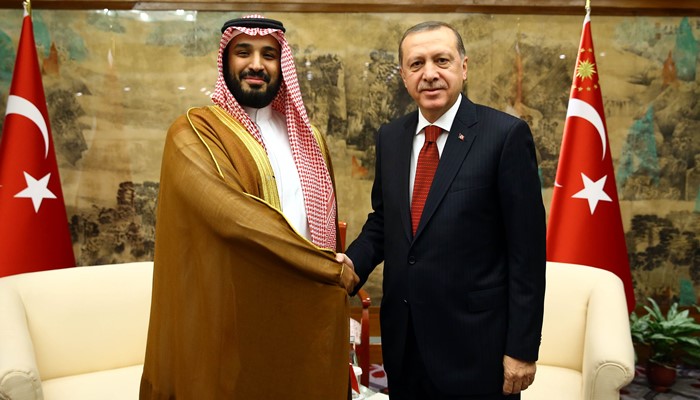Turkish President Recep Tayyip Erdoğan is expected to fly to Saudi Arabia on Thursday, mending a rift between the Suni powers caused by the murder of Riyadh critic Jamal Khashoggi in the kingdom’s İstanbul consulate in 2018, Agence France-Presse reported.
The two-day trip comes on the heels of an İstanbul court’s decision to halt the trial in absentia of 26 Saudi suspects linked to the gruesome killing, transferring the case to Saudi Arabia.
The Turkish decision infuriated human rights campaigners and Khashoggi’s widow Hatice Cengiz, who tried to appeal it in a higher court.
But it opened the way for Erdoğan to go ahead with the Saudi visit, which had been discussed for months.
“We don’t have a negative attitude towards Saudi Arabia in terms of normalizing relations, either commercially, economically, or politically,” Turkish Foreign Minister Mevlüt Çavuşoğlu told state television last month.
A Turkish official told AFP that Erdoğan was not expected to make any formal announcement during his trip to Riyadh, which is expected to stretch into Friday but will be closed to the press.
Erdoğan is due to meet Saudi Arabia’s King Salman, said the official, adding that Crown Prince Mohammed bin Salman will likely be in the delegation attending the talks.
Looking for funding
The murder of 59-year-old Khashoggi, a Saudi insider turned critic who wrote columns for The Washington Post, threw Saudi Arabia into international isolation and escalated Riyadh’s regional rivalry with Ankara.
Turkey infuriated the Saudis by pressing ahead with an investigation into the murder, which Erdoğan said was ordered at the “highest levels” of the Saudi government.
Saudi Arabia responded by unofficially putting pressure on Turkey’s economy through a boycott of key Turkish imports.
But trade between the two has been gradually improving, underscoring an easing of regional tensions that has also seen a reconciliation between Saudi Arabia and its gulf rival Qatar.
The Istanbul trial was suspended during a new spell of economic turmoil in Turkey, which has suffered from soaring inflation and a wave of winter street protests that have hurt Erdoğan’s popularity ahead of a general election next year.
Turkey is now drumming up financial support from energy-rich Gulf countries with which it has been at odds in the decade following the Arab Spring revolts.
Erdoğan has already tried to improve ties with Egypt and the United Arab Emirates, which has agreed a new investment package for Turkey.


